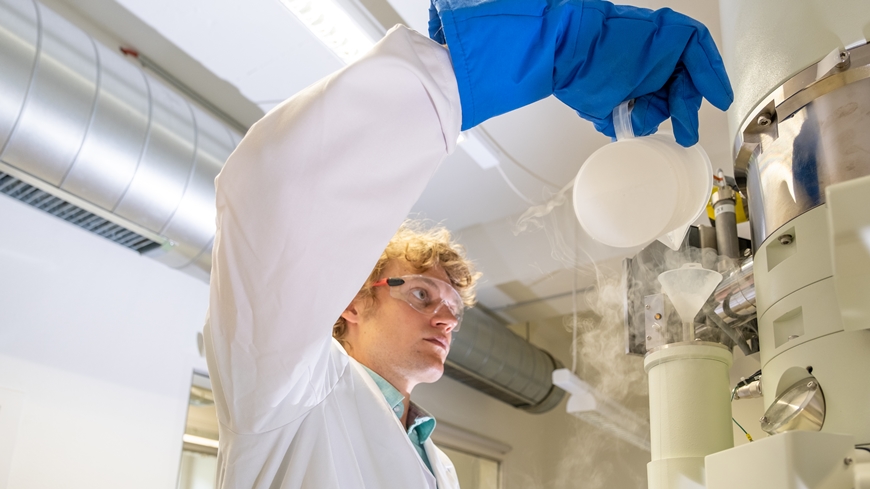Empa Young Scientist Fellowship
Efficient radiation therapy thanks to nanoparticles
Lukas Gerken has been awarded an Empa Young Scientist Fellowship for his research project to make radiation therapy for cancer patients more effective and at the same time gentler. The young Empa researcher is being supported by the Ria & Arthur Dietschweiler Foundation.

Empa researcher Lukas Gerken from Empa's Particles-Biology Interactions laboratory in St. Gallen and the Nanoparticle Systems Engineering laboratory at ETH Zurich is already using specially developed metal oxide nanoparticles in laboratory experiments to increase the sensitivity of tumors during radiation therapy. Now the young talent wants to equip the nanoparticles with further properties for increased effectiveness. He is being supported in this endeavor through an Empa Young Scientist Fellowship funded by the Ria & Arthur Dietschweiler Foundation.
Confident young researcher
Radiotherapy is one of the cornerstones of cancer treatment. However, some types of tumors have little to no response to radiation. Gerken's project is based on metal oxide nanoparticles used as "radiosensitizers." He had already demonstrated the effectiveness of the nanoparticles in laboratory experiments in preliminary work in Inge Hermann's team at Empa and ETH Zurich. Likewise, the researcher had established a manufacturing process using flame synthesis, paving the way for industrial production.
Now Lukas Gerken has set out to further increase the activity of the nanoparticles so that they supply the tumor tissue with oxygen, which further increases their sensitivity to irradiation. Other properties of the radiosensitizers are to be enhanced so that more cancer cells die during treatment. The results thus far are encouraging. Gerken: "We will continue to pursue this promising avenue to explore the nanoparticles' mechanism of action and specifically optimize their efficiency." He hopes that his new findings will advance the clinical application of nanoparticles in radiation therapy in the future.
Talent promotion thanks to the Ria & Arthur Dietschweiler Foundation
The Empa Young Scientist Fellowship is a funding instrument for exceptionally talented young scientists. The Fellow receives the financial means to carry out an independent research project for a period of two years. Fellowships are awarded by the Empa Zukunftsfonds in a competitive process to ensure that applications with the highest potential are being selected. This year, for the first time, an Empa Young Scientist Fellowship was funded by private donors, the Ria & Arthur Dietschweiler Foundation from St. Gallen, so that Lukas Gerken can now move ahead quickly with his research project.
Lukas Gerken
Particles-Biology Interactions Lab, Empa
Phone: +41 58 765 73 87
Nanopartikuläre Systeme, ETH Zürich
Dr. Martin Gubser
Empa Zukunftsfonds
Phone: +41 58 765 43 35
LRH Gerken, A Gogos, FHL Starsich, H David, ME Gerdes, H Schiefer, S Psoroulas, D Meer, L Plasswilm, DC Weber and IK Herrmann; Catalytic activity imperative for nanoparticle dose enhancement in photon and proton therapy; Nature Communication (2022), https://www.nature.com/articles/s41467-022-30982-5
-
Share






